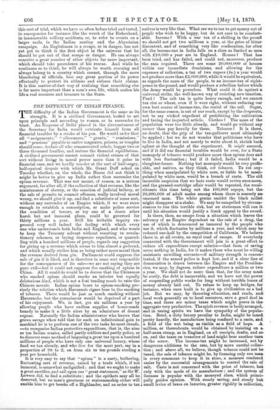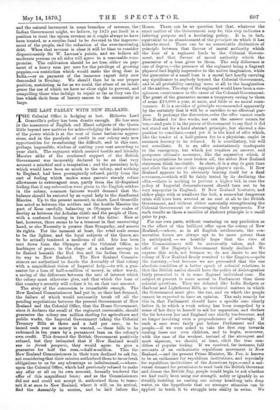TILE DIFFICULTY OF INDIAN FINANCE.
THY.; difficulty of the Indian Government is the same as its strength. It is a civilized Government, bodnd to act upon principle and according to reason, or to surrender its trust. An Emperor of Delhi placed in the circumstances of the Secretary for India would extricate himself from all financial troubles by a stroke of his pen. He would order that all "assignments," " allowances," " grants," "remissions," and "pensions" payable to native magnates, princes, or temples should cease, declare all who remonstrated rebels, beggar two or three thousand families, and restore the financial equilibrium. A civilized government cannot commit violent crimes of that sort without losing in moral power more than it gains in financial ease, and we hardly wonder at the sort of half-angry, half-cynical despair with which Mr. Grant Duff asked on Tuesday whether, on the whole, the House did not think it might be better to give up India rather than surrender the opium revenue. That was not meant, of course, as a serious argument, for after all, if the collection of that revenue, like the maintenance of slavery, or the sanction of judicial bribery, or the sale of permits to commit offences, really involved moral -wrong, we should give it up, and find a substitute of some sort, without any surrender of an Empire which, if we were stern enough to establish a conscription, or make police service the condition of tenure, or try one of a dozen other harsh but not immoral plans, could be governed for thirty millions a year. Still his irritable inquiry ex- pressed very well indeed the feeling with which every one who understands both India and England, and who wants to keep the Treasury solvent without resorting to revolu- tionary schemes, or trying desperate expedients, or quarrel- ling with a hundred millions of people, regards any suggestion for giving up a revenue which seems to him almost a godsend, and which usually strikes him as being rather more moral than the revenue derived from gin. Parliament could suppress the sale of gin if it liked, and is therefore in some sort responsible for the consequences of its sale—we are not saying they are pure evil—but it could not suppress the smoking of opium in China. All it could do would be to decree that the Chinaman -who smoked opium should smoke an inferior but equally deleterious kind, which is not a feat tending much to raise the Chinese morale. Indian opium bears to opium-smoking pre- cisely the relation which Havannah cigars bear to the smoking of tobacco. There would be just as much smoking without Havannahs, but the connoisseur would be deprived of a part of his enjoyment. We, in fact, get six millions a year by allowing people who have endless supplies of home-made brandy to make it a little nicer by an admixture of decent cognac. Naturally the Indian administrator who knows that grows savage when told that for such an infinitesimal gain to mankind he is to perform one of the two tasks he most dreads, —to reorganise Indian protective expenditure, that is, the nine or ten Indian armies, called partly soldiers and partly police, or to discover some method of imposing a great tax upon a hundred millions of people who have only one universal luxury, whose food we tax already, and who live for the most part, say in a proportion of 98 to 2, on from six to ten pounds sterling a year per household.
It is very easy to say that " opium " is a nasty, bothering, fluctuating sort of revenue, raised by a trade which, if not immoral, is somewhat undignified ; and that we ought to make a great sacrifice, and call upon our "great statesmen," as Sir W. Lawson did, to find a substitute ; and the epithets may all be deserved, but no man's greatness or statesmanship either will enable him to get breeks off a Highlander, and an order to tax
natives is very like that. What are we to tax to get money out of people who wish to be happy, but do not care to be comfort- able. Income With a war tax of a shilling in the pound we should not get two millions a year, at the price of bitter discontent, and of something very like confiscation, for after all, the income-tax in India falls on a class as limited as men with £10,000 a year are in England. Houses ? That has been tried, and has failed, and could not, moreover, produce the sum required. There are some 20,000,000 of houses. within our immediate dominion; and allowing for the. expenses of collection, a tax of two rupees (4s.) a year woul& not produce more than £3,000,000, while it would be equivalent,. as regards the mass of the people, to an income-tax of eight- pence in the pound, and would produce a rebellion before which, the Army would be powerless. What could it do against a• universal strike, the well-known way of resisting new taxation.. Food ? The salt tax is quite heavy enough, and we cannot tax rice or wheat, even if it were right, without reducing our- own best source of income-tax, the rental of the soil. Sugar, for the same reason, is out of our reach, except by the desperate,. not to say wicked expedient of prohibiting the cultivation and taxing the imported article. Clothes The mass of the. population wear too little already, and would go without any sooner than pay heavily for them. Tobacco ? It is there,_ no doubt, that the grip of the' tax-gatherer must ultimately be applied but we do not wonder that politicians who have- to live in India, and not merely to write about it, shrink back aghast at the thought of the experiment. It might succeed, and if it did our financial troubles would be over, for a State. monopoly of tobacco would produce more than opium does and with less fluctuation • but if it failed, India would be a slaughter-house. Nothing but monopoly would be very profit- able, and natives, as they think, eat tobacco. To eat any-- thing when manipulated by white men, or liable to be mani- pulated by white men, would be a breach of caste. The old. incurable suspicion that we hate caste would revive once more, and the greased-cartridge affair would be repeated, the recal- citrants this time being not the 100,000 sepoys, but the- 20,000,000 of adult males among whom there is scarcely an) unarmed man. The white grains amidst the black millet might disappear at a shake. We may be compelled by circum- stances to run this terrible risk, but no statesman will run it. until his situation would justify a frank appeal to the sword..
Is there, then, no escape from a situation which leaves the- solvency of an Empire dependent on the sale of a drug, the- use of which is denounced as immoral by the people who, use it, which fluctuates by millions a year, and which may be reduced one-half by the competition of California. We believe. there is, at all events, no royal road of escape. If everybody connected with the Government will join in a great effort to. reduce all expenditure except salaries—that form of saving saves nothing in India, for it makes those who must be willing assistants unwilling servants—if military strength is concen- trated, if the armed police is kept low, and if a clear line of demarcation is drawn between the Empire and the Presiden- cies, we may, by degrees, reduce expenditure a million or two a year. We shall not do more than that, for the army must be costly, the debt is immovable, and we have not the power of suspending public works for long without terrible losses of• money already laid out. To refuse to keep up bridges, for instance, when once built is to give up civilization as a bad. job. But we may, by throwing education, and roads, and local work generally on to local resources, save a good deal in time, and there are minor taxes which might prove in the' aggregate very productive. The spiritrevenue is badlyarranged,. and in taxing spirits we have the sympathy of the popula- tion. Betel, a dirty luxury peculiar to India, might be taxe& pretty heavily, the manufacture being confined to a caste, and a field of the nut being as visible as a field of hops. A. million, or thereabouts. would be obtained by insisting on a. half-anna stamp, as in England, on all receipts, drafts, and so. on, and the taxes on transfers of land might bear another turn, of the screw. The income-tax might be increased, not by dangerous additions to the rate, but by more careful collec- tion ; and above all, we believe, though tobacco could not be taxed, the sale of tobacco might be, by licensing only one maw in every commune to keep it in store, a measure rendered easier by the successful arrangements to control the sale of salt. Caste is not concerned with the price of tobacco, but only with the mode of its manufacture ; and the system of licences is popular with the moneyed class, which princi- pally guides opinion. With steady saving, and steady but small levies of taxes on luxuries, greater rigidity in collection,
and the natural increment in some branches of revenue, the Indian Government might, we believe, by 1875 put itself in a position to treat the opium revenue as it ought always to have been treated, as a surplus fund to be devoted to the improve- ment of the people, and the reduction of the ever-increasing debt. When that revenue is clear it will be time to consider dispassionately Sir W. Lawson's points, and we believe all moderate persons on all sides will agree to a reasonable com- promise. The cultivation should be set free, either on pay- ment of a heavy sum per acre for the privilege of growing poppies,—a restriction which would make the drug dear in India,—or on payment of the immense export duty now demanded in Bombay. We should then be in our proper position, restricting, as far as we could, the abuse of an indul- gence the use of which we have no clear right to prevent, and compelling those who indulge to repair as far as they can the loss which their form of luxury causes to the community at large.































 Previous page
Previous page